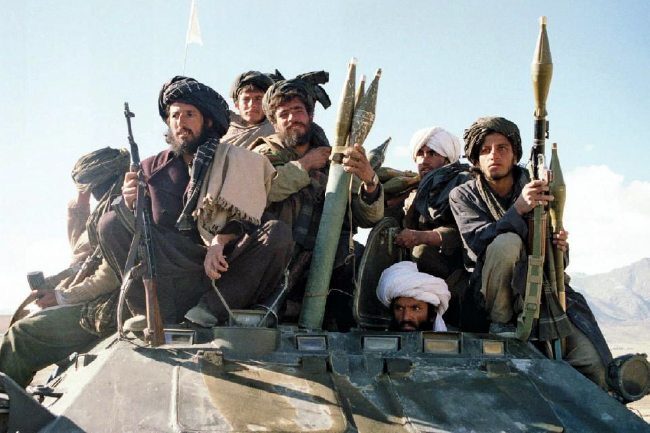The Taliban’s splint groups, which triggered a sense of mistrust between Kabul and Islamabad, have been hot recently. The militant fighters seek to intensify their attacks in Afghan-Pak borders. Within the last two years, the Taliban inflicted heavy causalities upon Afghan nation under “Spring Offensive” and “Omari Operation”. Although no special name has been declared for the Taliban’s heavy offensive this year, the spirit of the war is not changed and the militants will continue violence and bloodshed as ever before.
Pakistan, similar to Afghanistan, also came under the Taliban’s heavy offensive in recent months. In February, 88 people were killed when a suicide bomber targeted one of Pakistan’s most well-known shrines in the southern town of Sehwan. The attack, the worst in Pakistan since the 2014 attack on a school in Peshawar, was claimed by the Islamic State of Iraq and the Levant (ISIL). Moreover, the custodian of a shrine and two others have been arrested after murdering 20 devotees in Pakistan’s Punjab province. Abdul Waheed, custodian of the Ali Muhammad Gujjar shrine, drugged the devotees before beating them with sticks and stabbing them to death and handed himself over to Pakistani authorities. Police was unclear if the men had any affiliation with armed extremist groups such as the Pakistani Taliban, who often carry out attacks targeting shrines and Pakistan’s minorities.
The ISIL and Jamaat-ur-Ahrar seek to stoke sectarian violence in Pakistan and kill ethnic minority groups on the grounds of their race and beliefs. For instance, at least 22 people were killed, days earlier, when the Pakistani Taliban’s Jamaat-ur-Ahrar faction targeted a Shia Muslim mosque in the northwestern town of Parachinar.
In the wake of a string of suicide bombings and attacks that killed at least 130 people across Pakistan in February, Pakistan has launched Operation Radd-ul-Fassad (Elimination of Chaos) against the Pakistani Taliban. Pakistan has launched a series of military operations since 2007 targeting the Tehreek-e-Taliban Pakistan (TTP) and its allies, mostly in the country’s tribal areas. The last operation, Zarb-e-Azb, was launched in 2014, and targeted TTP bases in their northwestern stronghold of North Waziristan. Over the course of two years that operation expanded from North Waziristan to include military raids in towns and urban centers across the country. Operation Radd-ul-Fasaad, Pakistan’s military says, aims to continue to consolidate gains made during Operation Zarb-e-Azb.
Taking military action against the Taliban will be a positive step for dismantling warring factions or weakening their networks rather than pointing the finger at other countries. The operation should be carried out without dividing the Taliban into the good and bad. It is believed that Zarb-e-Azb failed to bear the desired result since warring factions are still able to carry out large-scale attacks.
No wonder the militant fighters seek to create gap between Afghanistan and Pakistan and have been successful in this regard. The escalated militancy put both the countries at the verge of military action against each other as Pakistan fired missile at Afghanistan’s soil following the terrorist attacks at Sehwan in February.
Moreover, Afghanistan’s refugees were put under pressure in Pakistan. In 2014, after a Tehreek-e-Taliban-claimed school attack in Peshawar killed more than 143 people, including 132 children, the Pakistani government announced a decision to deport registered and unregistered Afghans on the grounds of national security, accusing some refugees of posing a threat. Since then, incidents of police abuse, beatings and extortion against Afghans has reportedly skyrocketed, prompting many to return to war-torn Afghanistan, according to US-based rights group Human Rights Watch.
Under the UN refugee agency’s (UNHCR) scheme, which was launched in 2002, as many as 370,000 registered Afghan refugees had repatriated voluntarily by the end of 2016. Citing donor shortfalls, the UNHCR last November said it would end cash support to returnees in mid-December - but the incentive resumed on March 1. According to recent report, the UN has cut in half a cash incentive for Afghan refugees in Pakistan to return to their country. The reduction – from $400 to $200 – comes as a voluntary repatriation operation has reportedly resumed, with 16,000 people based in Pakistan’s Khyber-Pakhtunkhwa province registered to head home.
To be honest, it is not only Pakistan that suffers from militancy but Afghanistan bears the brunt of insurgency as the International Crisis Group (ICG) said that the future of Afghanistan’s unity government is “shaky”. Terrorist groups try to destabilize the entire region and have been changed into a regional and global crisis. Therefore, Moscow hosted a conference about peace in Afghanistan that was attended by regional countries, however, the US refused to attend the meeting saying that Russia legalize the Taliban group through bringing it to the peace process. Russia said that it supported peace under the leadership of Afghanistan.
Whether or not such conferences bear the desired result, the victims of terrorism, mainly Pakistan and Afghanistan must not let the militants to fish in the troubled waters. Both the countries are targeted by Taliban and many other warring factions. Normally, the warm weather paves the ground for the Taliban’s heavy offensives. To mitigate the insurgency, Kabul and Islamabad must launch not only defensive but also offensive attacks against the Taliban. Meanwhile, the gap between the two countries should be narrowed instantaneously.
Home » Opinion » Terrorism Remains a Threat to Afghanistan and Pakistan
Terrorism Remains a Threat to Afghanistan and Pakistan
|

